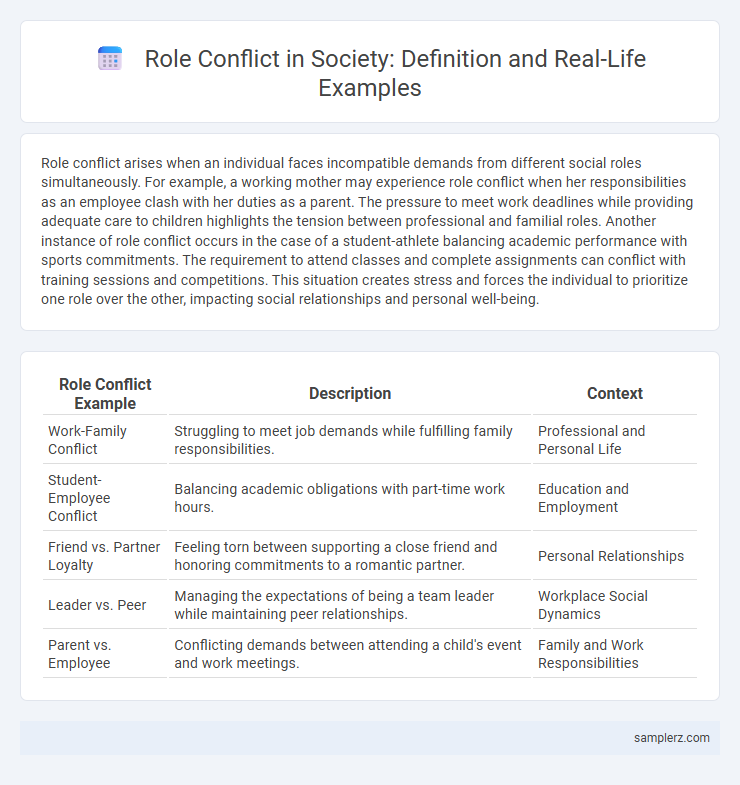Role conflict arises when an individual faces incompatible demands from different social roles simultaneously. For example, a working mother may experience role conflict when her responsibilities as an employee clash with her duties as a parent. The pressure to meet work deadlines while providing adequate care to children highlights the tension between professional and familial roles. Another instance of role conflict occurs in the case of a student-athlete balancing academic performance with sports commitments. The requirement to attend classes and complete assignments can conflict with training sessions and competitions. This situation creates stress and forces the individual to prioritize one role over the other, impacting social relationships and personal well-being.
Table of Comparison
| Role Conflict Example | Description | Context |
|---|---|---|
| Work-Family Conflict | Struggling to meet job demands while fulfilling family responsibilities. | Professional and Personal Life |
| Student-Employee Conflict | Balancing academic obligations with part-time work hours. | Education and Employment |
| Friend vs. Partner Loyalty | Feeling torn between supporting a close friend and honoring commitments to a romantic partner. | Personal Relationships |
| Leader vs. Peer | Managing the expectations of being a team leader while maintaining peer relationships. | Workplace Social Dynamics |
| Parent vs. Employee | Conflicting demands between attending a child's event and work meetings. | Family and Work Responsibilities |
Balancing Professional and Family Responsibilities
Balancing professional and family responsibilities often leads to role conflict, where individuals struggle to meet the demands of their job while fulfilling family obligations. This conflict can result in stress, reduced productivity, and strained relationships due to competing time commitments and emotional energy. Effective boundary-setting and time management strategies are essential to mitigate the negative impacts of role conflict in social environments.
Navigating Friendship Versus Workplace Expectations
Navigating the tension between friendship and workplace expectations often leads to role conflict, where individuals struggle to balance camaraderie with professionalism. For instance, an employee may find it challenging to enforce company policies when dealing with close friends, risking favoritism or strained relationships. This conflict requires clear boundaries and effective communication to maintain both social bonds and workplace integrity.
Parental Duties Versus Personal Aspirations
Role conflict often arises when parents struggle to balance demanding parental duties with pursuing personal aspirations such as career advancement or education. This tension can lead to stress and reduced satisfaction in both family and individual contexts, highlighting the need for effective time management and social support systems. Research indicates that flexible work arrangements and community resources significantly mitigate the impact of this conflict on parents' well-being and personal growth.
Student Life Versus Part-Time Employment
Balancing academic responsibilities with part-time employment creates a common role conflict for students, often leading to stress and time management challenges. Students must navigate competing demands between attending classes, completing assignments, and meeting job expectations. This tension impacts academic performance and social interactions, highlighting the complexity of managing dual roles effectively.
Cultural Traditions Versus Modern Values
Role conflict arises when individuals face tension between adhering to cultural traditions and embracing modern values, particularly in social settings. For example, a young adult may struggle to balance respect for family expectations rooted in long-standing customs with personal aspirations influenced by contemporary social norms. This clash often leads to internal and interpersonal challenges as they navigate differing societal pressures.
Gender Roles and Career Ambitions
Gender roles often create role conflict when societal expectations of femininity or masculinity clash with individual career ambitions, such as women pursuing leadership positions in male-dominated industries. This conflict manifests as stress or decreased job satisfaction when professional goals contradict traditional caregiving duties or appearance norms tied to gender. Studies highlight that balancing these competing roles can impact mental health and career progression, emphasizing the need for organizational policies supporting gender equity and work-life balance.
Volunteer Commitments Versus Paid Work
Role conflict arises when individuals struggle to balance volunteer commitments with paid work responsibilities, causing stress and reduced effectiveness in both areas. For instance, a person volunteering at a local shelter may face scheduling clashes with overtime demands at their job, leading to missed shifts or work deadlines. This situation highlights the challenge of managing competing social roles and the need for organizational support to accommodate voluntary engagement alongside employment obligations.
Caregiver Obligations Versus Social Life
Caregivers often experience role conflict when balancing their obligations to provide care with maintaining a fulfilling social life. The intense demands of caregiving can lead to social isolation, as time and energy are limited for social interactions and activities. Research shows that caregivers who struggle with this conflict report higher stress levels and decreased overall well-being.
Peer Pressure Versus Personal Ethics
Peer pressure often challenges an individual's personal ethics when social groups encourage behaviors that conflict with one's moral values, such as engaging in dishonest or risky activities to gain acceptance. This role conflict arises when the desire to belong clashes with internal principles, causing psychological stress and potential identity struggles. Understanding how peer influence can override personal ethics is crucial in addressing social conformity and promoting ethical decision-making.
Religious Beliefs Versus Social Norms
Religious beliefs often shape personal values and behaviors, which can clash with prevailing social norms, creating role conflict for individuals navigating both spheres. For example, a person adhering to strict dietary laws may face challenges participating in social gatherings where food choices contradict their religious rules. This tension between maintaining religious obligations and conforming to social expectations exemplifies the complex dynamics of role conflict in social contexts.

example of role conflict in social Infographic
 samplerz.com
samplerz.com